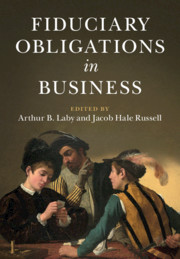Book contents
- Fiduciary Obligations in Business
- Fiduciary Obligations in Business
- Copyright page
- Dedication
- Contents
- Contributors
- Editors’ Acknowledgments
- Introduction The Decline and Rise of Fiduciary Obligations in Business
- Part I Identifying Fiduciaries and Their Duties
- Part II Gaps and Alternatives in Fiduciary Regimes
- Part III Historical and Comparative Perspectives
- 11 Delaware Corporate Law and the “End of History” in Creditor Protection
- 12 The Independent Director in Delaware and German Corporate Law
- 13 For Whom Are Nonprofit Managers Trustees? The Contractual Revolution in Charity Governance
- 14 Fiduciary Law and Japanese Nonprofits: A Historical and Comparative Synthesis
- Part IV Stakeholders and Society
- Index
13 - For Whom Are Nonprofit Managers Trustees? The Contractual Revolution in Charity Governance
from Part III - Historical and Comparative Perspectives
Published online by Cambridge University Press: 20 August 2021
- Fiduciary Obligations in Business
- Fiduciary Obligations in Business
- Copyright page
- Dedication
- Contents
- Contributors
- Editors’ Acknowledgments
- Introduction The Decline and Rise of Fiduciary Obligations in Business
- Part I Identifying Fiduciaries and Their Duties
- Part II Gaps and Alternatives in Fiduciary Regimes
- Part III Historical and Comparative Perspectives
- 11 Delaware Corporate Law and the “End of History” in Creditor Protection
- 12 The Independent Director in Delaware and German Corporate Law
- 13 For Whom Are Nonprofit Managers Trustees? The Contractual Revolution in Charity Governance
- 14 Fiduciary Law and Japanese Nonprofits: A Historical and Comparative Synthesis
- Part IV Stakeholders and Society
- Index
Summary
This chapter chronicles an unnoticed aspect of the intellectual history of the “contractarian” paradigm, the descriptive claim that firms are best characterized as nexus of contracts. Although the paradigm’s rise in the 1980s in the corporate world is well known, little has been said about its success in rewriting both theory and doctrine in charitable and not-for-profit law. The contract paradigm has reshaped the questions that not-for-profit scholarship attempts to answers, and it is tightly linked to developments in not-for-profit doctrine and practice. Key examples include the growth of donor standing—the notion that not-for-profits have a fiduciary duty to their donors, and that donors may bring suit for breaches—and the growing obsession with “donor intent” throughout the not-for-profit sphere. I contrast contractarianism with an institutionalist “public trust” conception of charities, which was the prevailing intellectual paradigm for most of the 20th century.
Keywords
- Type
- Chapter
- Information
- Fiduciary Obligations in Business , pp. 241 - 260Publisher: Cambridge University PressPrint publication year: 2021

